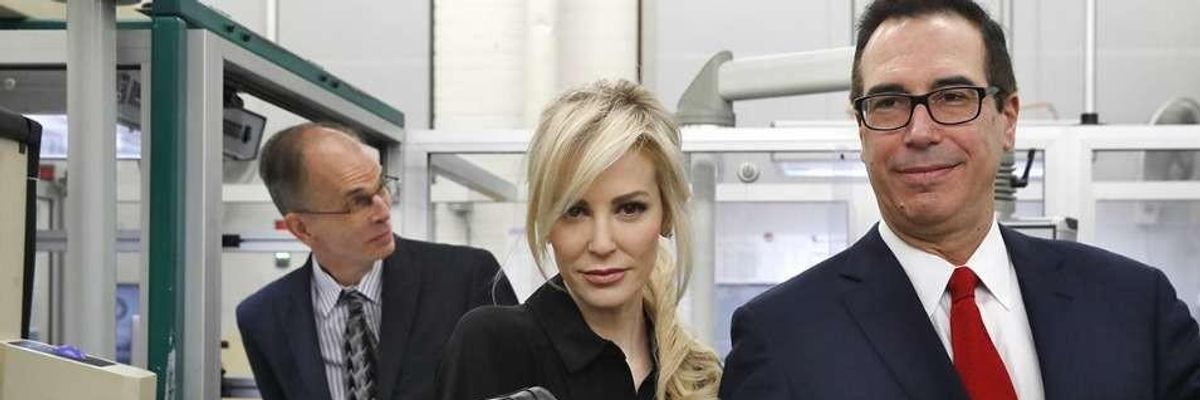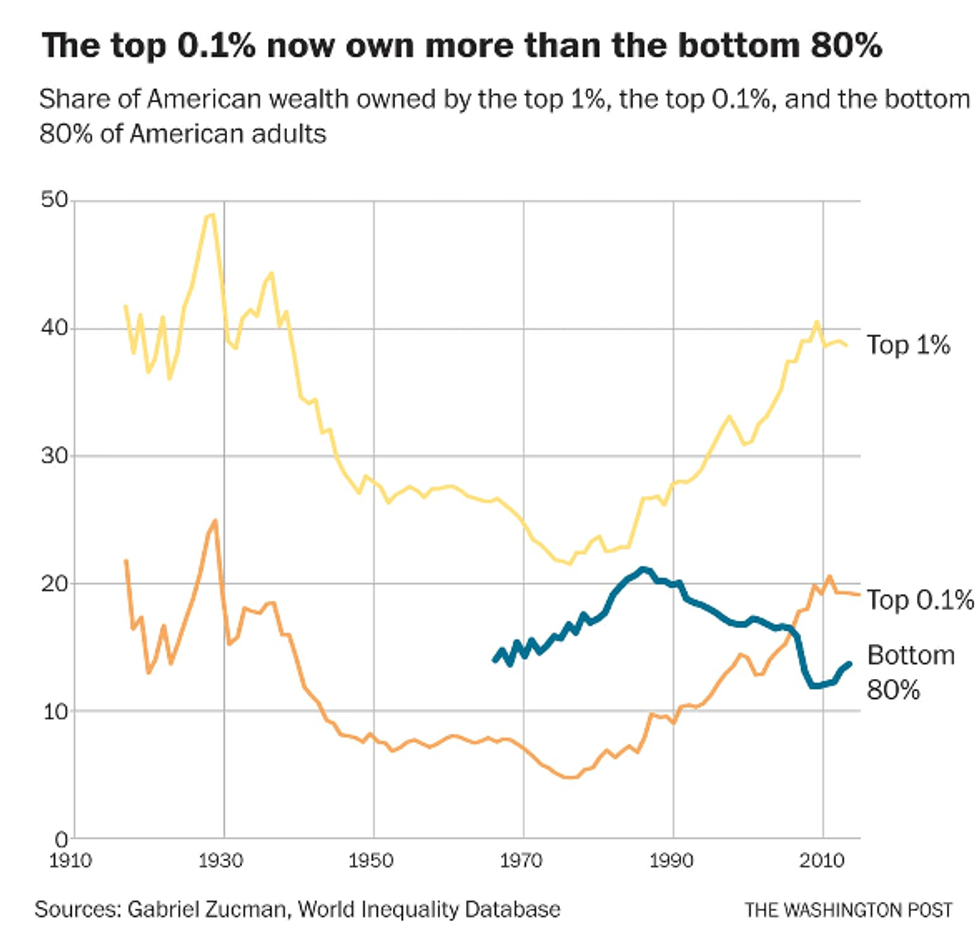

SUBSCRIBE TO OUR FREE NEWSLETTER
Daily news & progressive opinion—funded by the people, not the corporations—delivered straight to your inbox.
5
#000000
#FFFFFF
To donate by check, phone, or other method, see our More Ways to Give page.


Daily news & progressive opinion—funded by the people, not the corporations—delivered straight to your inbox.

Treasury Secretary Steven Mnuchin and his wife, Louise Linton, hold up a sheet of new $1 bills, the first currency notes bearing his and U.S. Treasurer Jovita Carranza's signatures on Nov. 15 at the Bureau of Engraving and Printing in Washington. (Photo: Jacquelyn Martin/AP)
As survey data continues to show that raising taxes on the wealthy is extremely popular among the U.S. public, new research by inequality expert and University of California, Berkeley economist Gabriel Zucman found that the richest 0.00025 percent of the American population now owns more wealth than the 150 million adults in the bottom 60 percent.
Zucman, who helped Sen. Elizabeth Warren (D-Mass.) develop her "Ultra-Millionaire Tax" proposal, observed in a working paper (pdf) that "U.S. wealth concentration seems to have returned to levels last seen during the Roaring Twenties."
According to Zucman's research, the richest 0.00025 percent--just 400 Americans--have seen their share of America's national wealth triple since the 1980s, while the wealth of much of the U.S. population has stagnated or declined.
\u201cThe 400 richest Americans have tripled their share of the nation\u2019s wealth since the early 1980s and now own more of the country\u2019s riches than the 150 million adults in the bottom 60% of the wealth distribution. https://t.co/wVFzJzPW3C\u201d— Steven Greenhouse (@Steven Greenhouse) 1549745723
\u201c"The 400 richest Americans \u2014 the top 0.00025 percent of the population \u2014 have tripled their share of the nation\u2019s wealth since the early 1980s, according to a new working paper on wealth inequality by Berkeley economist Gabriel Zucman." https://t.co/TtkVcHnmJM\u201d— Alec MacGillis (@Alec MacGillis) 1549745340
As the Washington Post's Christopher Ingraham noted in a breakdown of Zucman's research, adults in the bottom 60 percent of the wealth distribution "saw their share of the nation's wealth fall from 5.7 percent in 1987 to 2.1 percent in 2014."
Consolidation of wealth at the very top, Ingraham observes, "is eroding security from families in the lower and middle classes, who rely on their small stores of wealth to finance their retirement and to smooth over economic shocks like the loss of a job. And it's consolidating power in the hands of the nation's billionaires, who are increasingly using their riches to purchase political influence."

Zucman's research comes as members of Congress and 2020 presidential candidates are pushing a variety of plans to begin reducing America's staggering wealth and income inequality by raising taxes on those at the very top.
Sen. Elizabeth Warren (D-Mass.), who officially launched her 2020 presidential campaign on Saturday, has proposed an annual tax of two percent on assets over $50 million.
Last month, Sen. Bernie Sanders (I-Vt.)--who is reportedly close to announcing his 2020 candidacy--introduced the the For the 99.8% Act, which would establish a 77 percent tax on all estates over $1 billion.
And Rep. Alexandria Ocasio-Cortez (D-N.Y.) has suggested imposing a top marginal tax rate of 70 percent on those who make over $10 million.
Pointing to polling data showing that 76 percent of Americans believe the rich should pay more in taxes, Indivisible's Chad Bolt concluded: "Raising taxes on the wealthy isn't just good policy. It's also good politics."
Dear Common Dreams reader, The U.S. is on a fast track to authoritarianism like nothing I've ever seen. Meanwhile, corporate news outlets are utterly capitulating to Trump, twisting their coverage to avoid drawing his ire while lining up to stuff cash in his pockets. That's why I believe that Common Dreams is doing the best and most consequential reporting that we've ever done. Our small but mighty team is a progressive reporting powerhouse, covering the news every day that the corporate media never will. Our mission has always been simple: To inform. To inspire. And to ignite change for the common good. Now here's the key piece that I want all our readers to understand: None of this would be possible without your financial support. That's not just some fundraising cliche. It's the absolute and literal truth. We don't accept corporate advertising and never will. We don't have a paywall because we don't think people should be blocked from critical news based on their ability to pay. Everything we do is funded by the donations of readers like you. Will you donate now to help power the nonprofit, independent reporting of Common Dreams? Thank you for being a vital member of our community. Together, we can keep independent journalism alive when it’s needed most. - Craig Brown, Co-founder |
As survey data continues to show that raising taxes on the wealthy is extremely popular among the U.S. public, new research by inequality expert and University of California, Berkeley economist Gabriel Zucman found that the richest 0.00025 percent of the American population now owns more wealth than the 150 million adults in the bottom 60 percent.
Zucman, who helped Sen. Elizabeth Warren (D-Mass.) develop her "Ultra-Millionaire Tax" proposal, observed in a working paper (pdf) that "U.S. wealth concentration seems to have returned to levels last seen during the Roaring Twenties."
According to Zucman's research, the richest 0.00025 percent--just 400 Americans--have seen their share of America's national wealth triple since the 1980s, while the wealth of much of the U.S. population has stagnated or declined.
\u201cThe 400 richest Americans have tripled their share of the nation\u2019s wealth since the early 1980s and now own more of the country\u2019s riches than the 150 million adults in the bottom 60% of the wealth distribution. https://t.co/wVFzJzPW3C\u201d— Steven Greenhouse (@Steven Greenhouse) 1549745723
\u201c"The 400 richest Americans \u2014 the top 0.00025 percent of the population \u2014 have tripled their share of the nation\u2019s wealth since the early 1980s, according to a new working paper on wealth inequality by Berkeley economist Gabriel Zucman." https://t.co/TtkVcHnmJM\u201d— Alec MacGillis (@Alec MacGillis) 1549745340
As the Washington Post's Christopher Ingraham noted in a breakdown of Zucman's research, adults in the bottom 60 percent of the wealth distribution "saw their share of the nation's wealth fall from 5.7 percent in 1987 to 2.1 percent in 2014."
Consolidation of wealth at the very top, Ingraham observes, "is eroding security from families in the lower and middle classes, who rely on their small stores of wealth to finance their retirement and to smooth over economic shocks like the loss of a job. And it's consolidating power in the hands of the nation's billionaires, who are increasingly using their riches to purchase political influence."

Zucman's research comes as members of Congress and 2020 presidential candidates are pushing a variety of plans to begin reducing America's staggering wealth and income inequality by raising taxes on those at the very top.
Sen. Elizabeth Warren (D-Mass.), who officially launched her 2020 presidential campaign on Saturday, has proposed an annual tax of two percent on assets over $50 million.
Last month, Sen. Bernie Sanders (I-Vt.)--who is reportedly close to announcing his 2020 candidacy--introduced the the For the 99.8% Act, which would establish a 77 percent tax on all estates over $1 billion.
And Rep. Alexandria Ocasio-Cortez (D-N.Y.) has suggested imposing a top marginal tax rate of 70 percent on those who make over $10 million.
Pointing to polling data showing that 76 percent of Americans believe the rich should pay more in taxes, Indivisible's Chad Bolt concluded: "Raising taxes on the wealthy isn't just good policy. It's also good politics."
As survey data continues to show that raising taxes on the wealthy is extremely popular among the U.S. public, new research by inequality expert and University of California, Berkeley economist Gabriel Zucman found that the richest 0.00025 percent of the American population now owns more wealth than the 150 million adults in the bottom 60 percent.
Zucman, who helped Sen. Elizabeth Warren (D-Mass.) develop her "Ultra-Millionaire Tax" proposal, observed in a working paper (pdf) that "U.S. wealth concentration seems to have returned to levels last seen during the Roaring Twenties."
According to Zucman's research, the richest 0.00025 percent--just 400 Americans--have seen their share of America's national wealth triple since the 1980s, while the wealth of much of the U.S. population has stagnated or declined.
\u201cThe 400 richest Americans have tripled their share of the nation\u2019s wealth since the early 1980s and now own more of the country\u2019s riches than the 150 million adults in the bottom 60% of the wealth distribution. https://t.co/wVFzJzPW3C\u201d— Steven Greenhouse (@Steven Greenhouse) 1549745723
\u201c"The 400 richest Americans \u2014 the top 0.00025 percent of the population \u2014 have tripled their share of the nation\u2019s wealth since the early 1980s, according to a new working paper on wealth inequality by Berkeley economist Gabriel Zucman." https://t.co/TtkVcHnmJM\u201d— Alec MacGillis (@Alec MacGillis) 1549745340
As the Washington Post's Christopher Ingraham noted in a breakdown of Zucman's research, adults in the bottom 60 percent of the wealth distribution "saw their share of the nation's wealth fall from 5.7 percent in 1987 to 2.1 percent in 2014."
Consolidation of wealth at the very top, Ingraham observes, "is eroding security from families in the lower and middle classes, who rely on their small stores of wealth to finance their retirement and to smooth over economic shocks like the loss of a job. And it's consolidating power in the hands of the nation's billionaires, who are increasingly using their riches to purchase political influence."

Zucman's research comes as members of Congress and 2020 presidential candidates are pushing a variety of plans to begin reducing America's staggering wealth and income inequality by raising taxes on those at the very top.
Sen. Elizabeth Warren (D-Mass.), who officially launched her 2020 presidential campaign on Saturday, has proposed an annual tax of two percent on assets over $50 million.
Last month, Sen. Bernie Sanders (I-Vt.)--who is reportedly close to announcing his 2020 candidacy--introduced the the For the 99.8% Act, which would establish a 77 percent tax on all estates over $1 billion.
And Rep. Alexandria Ocasio-Cortez (D-N.Y.) has suggested imposing a top marginal tax rate of 70 percent on those who make over $10 million.
Pointing to polling data showing that 76 percent of Americans believe the rich should pay more in taxes, Indivisible's Chad Bolt concluded: "Raising taxes on the wealthy isn't just good policy. It's also good politics."